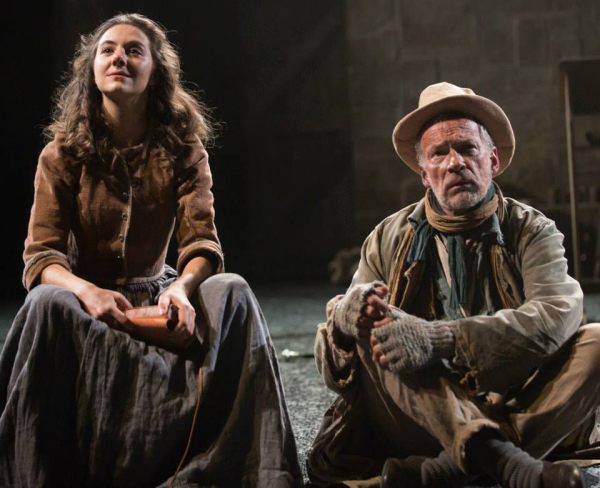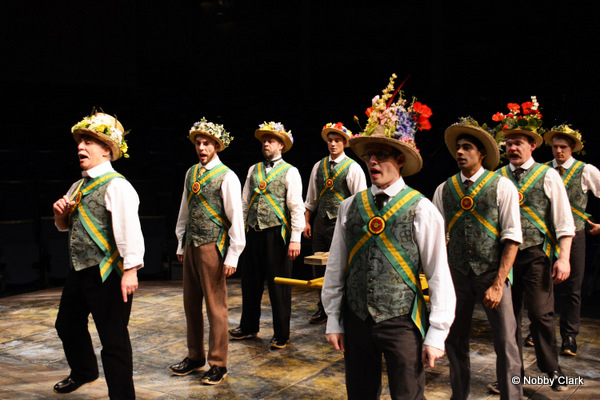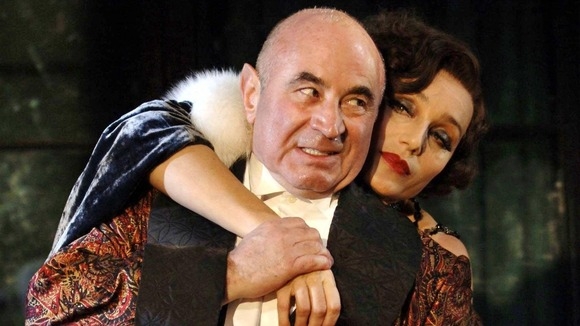Michael Coveney: The joys of touring with Friel and Rutter, O'Casey restored, Edna Doré remembered

© Mark Douet
Translations survives (just about) the test of time
I was at the very first performance of Brian Friel's great play Translations in the Guildhall in Londonderry in 1980 – the cast included Ray McAnally, Stephen Rea and a promising newcomer, Liam Neeson – so it seemed only right that I should catch the penultimate performance of the English Touring Theatre's revival at the Rose, Kingston, last weekend.
The play is a parable of colonialism in the context of a 19th century hedge school in rural Donegal, where farm workers learn Latin and Greek, English soldiers are making new maps of the area and history looms in the present.
There's the great scene, too, where a soldier and an Irish girl make love in different languages, neither of them understanding what the other is saying, both speaking in English. It was beautifully played in James Grieve's production by James Northcote, another promising newcomer, and Beth Cooke, daughter of Sorcha Cusack, an obvious beneficiary of the family gene pool.
The role of Hugh, the hedge school teacher in frayed top coat and battered topper, was uproariously inhabited by Niall Buggy, invoking the cloud-topped towers of Ilium in his memories of past military glory and demanding instant parsing and translation of the ancient languages from his cowed charges. Full-throated he was, and that would be putting it mildly, while his sidekick Jimmy Jack, slyly inflected by John Conroy, Hannah James-Scott as a farm girl and Rory Murphy as the doltish Doulty (the Neeson role) did his bidding.
Not everything was perfect, though. There was some hideous recorded fiddle music and, even worse, an interpolated scene to bring the offstage social alive in a company jig that briefly turned the play into a heritage musical.

No such embarrassment in Northern Broadsides' An August Bank Holiday Lark (pictured), which played at the Watford Palace this week. The Morris dancing (have you seen Morris dancing? I didn't know he could, boom, boom) is an integral part of Deborah McAndrew's fine First World War play, set entirely in a cotton-spinning community in the Pennines, and ebulliently executed by Barrie Rutter and his merry band of brothers (the sisters are confined to musical instruments).
The Silver Tassie proves a National treasure trophy
I caught up, too, with the National Theatre's revival of Sean O'Casey's experimental masterpiece, The Silver Tassie, and just in time to realise that the play is a sort of template for An August Bank Holiday Lark, but without the scene at the front. I was amazed to see one reviewer, Michael Arditti in the Sunday Express, claim that W B Yeats was right to reject this play when O'Casey submitted it to the Abbey Theatre in 1928. Not for the first (or last) time, the London theatre came to the rescue in the following year, with Charles Laughton playing the wounded soldier and Augustus John designing the monastery ruin for the incantatory second act, one of the great scenes of modern drama.
Yeats later Yeats retracted his strictures, or at least made his peace with O'Casey, and the playwright went on to write several more strangely intriguing, poetic dramas, but not for the Abbey, pushing ever deeper into his own personal experience. You do feel, watching Howard Davies' fine production, that this is the sort of classic play the National is funded to perform; and I'm not aware of any major revivals since John Barton's at the RSC in 1969 (with Ben Kingsley as the speaking skull, the Croucher, in the ruins) and a less imposing version directed by Hugh Hunt at the suitably contrite Abbey three years later.
Edna's bark was far worse than her bite (and her teeth)
There was a great operatic version of The Silver Tassie – a play full of chants, songs and litanical dialogue in the first place – at the ENO in 2000, with music by Mark-Anthony Turnage, a libretto adapted by Amanda Holden, and a really terrific production by Bill Bryden. I was talking about this opera with Bryden himself last week at a National Theatre memorial meeting in the Green Room for Edna Doré, the wonderful character actress who died a few weeks ago aged 92.
Doré was a stalwart of Bill Bryden's Cottesloe company that performed Tony Harrison's The Mysteries and Keith Dewhurst's adaptation of Lark Rise to Candleford. In the war, she was a dancing girl in Phyllis Dixey's striptease revues at the Whitehall Theatre (now the Trafalgar Studios, alas) and more recently she gave remarkable "old lady" performances in Mike Leigh's High Hopes and opposite Paul O'Grady in a television sitcom set in a bingo hall. On the first day of rehearsals, O'Grady recalled in a hilarious speech at the meeting, there was a clattering noise on the floor behind him and Edna piped up, "Oh Gawd, my bleedin' teeth have fallen out again."











